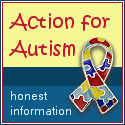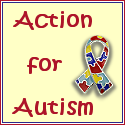Lots of thanks for all those who helped to create attention for Gomey, so he wouldn't disappear in anonimity, like so many autistic people who are victim of "the system".
More than 80.000 people clicked the graphic, which was displayed on a countless number of blogs. Bloggers blogged about Gomey. People reacted on Twitter and professionals did what they had to do.
So a huge "THANK YOU" to all of you for taking a stand for Gomey.
What happened:
A human rights lawyer, Julius Grey, got involved and he called the hospital.
Gomey's mother also spoke to an ombudsman (a woman) of the hospital, and she mentioned to know that the lawyer had been in contact with the hospital.
During a visit to hospital the woman asked to speak to Gomey privately.
She asked him whether he wanted to go home or to an english speaking hospital.
(It turned out that the judge has made a request to transfer him to an english speaking hospital, but the french one was reluctant to let him go there.
They prolonged his stay and even tried to persuade him to stay there.)
Ofcourse Gomey wanted to go home and eventually he was able to do so.
At home he was very insecure. He kept asking if they would come again to get him.
His feeling of safety has been shaken in such a bad way that he wants to move out of town and out of Quebec. He would welcome a move out of Canada.
The fact that he wants to leave his wellknown life makes clear how much his life is shaken by what has happened. His feeling of living somewhere secure and stable has gone.
Any help to get the family a new place to live will be appreciated.
Because the winter took it's time this year, Gomey has been able to ski again.
And he has played scrabble again.
He's trying hard to find a balance and to deal with his bad memories.
He's traumatized.
Unnecessary traumatized.
Thank you all for helping!!!
Gomey is one of many autistic people who are victim of the lack of knowledge of people about autism.
As soon as authorities only listen to those who hide their lack of knowledge behind a professional image people become a victim and are traumatized.
Mistakes can not be completely undone, Especially not, because there are no laws that grant therapy after mistakes, even though some professions, like psychologists, have ethical guidelines to undo harm that is done.
Like Gomey, many people all over the world live in constant fear to be taken from their homes just because they are autistic.
Unless we are able to create more understanding and acceptance for the uniqueness of each and every human being, and unless we're able to make it impossible for professionals who make these terrible mistakes to work ever in the area of psychology and psychiatry again, Gomey will be a symbol for all these misunderstood beautiful people.
With permission of Gomey's sister:
To my favorite dearest sister,
It has been 2 weeks since I've talked to you or seen you.
I wasn't able to warn you a head of time that I would be stolen out of my home.
I was numb the whole way to the hospital.
I didn't know what to think.
My fear is consuming me.
I told mom, that I have to share with you what happened to me.
Because we are so close.
We share so many wonderful moments together.
And I'm looking for comfort from you, in these darkest days of my life.
I know in my heart, that you suffer every minute knowing I am here.
Where I am, is the worst place to be.
I can not sleep at night, from all the screams, yells and the laughing of the nurses late at night.
With out any consideration for the people that are here.
After all we are in the "coco nest"
There is one educator amongst others, that treats me me very abruptly
Nothing I am doing is good enough for him. His name is Eugene and he doesn't seem to like me very much, and it is making my life here very difficult. And yesterday the educator by the name of Pierre, disturbed me by trying to touch my belly button. You know how much I don't like to be touched by strangers, and especially in stressful situation like this one. There is also an educator that comes in the evening, his name is Marcelle, I hope he will be here all day every day. Because he's really nice to me.
For the last 10 days, no body came to see or talk to me, from the medical staff, in regards to the court order for an evaluation. Why did they ask for 21 days if they are not doing anything?
It feels to me that I'm being held as a hostage for their next plan (they probably need some
time for preparation)
I'm extremely sad, confused and upset, that I can not get a definite answer from mom, of when I'll be free.
In the last 13 days, I haven't been outside, not even once, Nofar.
I'm pacing the hospital halls hours upon hours to pass the time,
But the time doesn't pass, Nofar.
I told mom a few times, that I'm disturbed by the food choices.
They don't give me another choice, but Milk as beverage, beef, or pork.
I explained that the medical tests show that I have senstivity to these products, and I'm not able
to consume them.
I offered that I would eat a sandwich with Jam, instead of meat, but they refused.
I also asked them for Bread with Jam for a snack, and they also refused.
Since I came here there hasn't been one day with out severe stomach pain and other pain in various areas of my body, but they ignored my situation.
Chantal (from the case management) promised my mom that I can go every day with supervision to play basketball, in 13 days I've only gone once for a half an hour.
Why don't they take me outside, nofar?
There is no computer and no other way to contact you,
And I know and feel that you have to know what's going on with me,
and I asked mom, to let you know, about my condition and what I'm going through.
So you can talk with the ombudsman and let them know, some of the details.
I would like you, Nofar, to be my voice and speak on my behalf.
Because they took my rights away and with that my voice.
I'm completely isolated with out any human contact.
Nofar, How long will it take until I can hug you and mom again?
I decided to write you because I knew that you would do everything and anything to help me.
I love you and miss you and I hope that soon we can do all the fun stuff that we do, together.
Gomey
Fixed post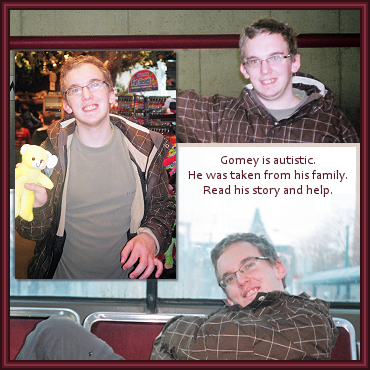
For Gomey and his family daily life, dealing with the challenges of autism, has changed into nightmare.
Lack of knowledge by others often disrupts the relative wellbeing of autism families, and here too this is the case.
Gomey and his family worked hard to learn to deal with specific autism issues.
Now he's 19 he's a so called high functioning autist.
On wednesday january 27 Gomey and his mother received a message he would have to leave his home and within 2 hours 6 policemen and several social workers came and took Gomey out of his secure environment and brougth him to a psychiatric hospital in Montreal called "Hôpital Rivière-Des-Prairies".
The young man, who has never slept a night outside his home, was brought from the familair, english speaking, environment into a complete strange situation without any preparation whatsoever. Added to his, for autism characteristic, impairment of cummunications skills a language barrier, because the hospital is french oriented. He does speak some words in French, but not enough to feel comfortable... if that would be possible under those circumstances.
Why he was brought to a hospital where french is the language of communication in a town where also a hospital is available where english is spoken is a big question.
At february 1 Gomey finally could hug his family. The days before familymembers were not allowed to visit or call him, information about his wellbeing was withheld.
Gomey himself doesn't know why he has to be there. He feels imprissoned. He has lost everything he had.
He wants to go home with his mother, far away from the screaming he hears often during the day.
And all due to one person who doesn't understand autism.
She's a social worker who took over the yearly ritual of a short assessment of the family to reach an agreement about some hours of respite care.
She just started 4 months ago and after speaking with Gomey for not even an hour she decided she knew it all and put the whole train of breaking up a happy family in motion.
She took matters in her own hands, probably without even consulting the professionals who know Gomey well and who never saw any reason to doubt Gomey, his family and his living conditions.
The court order said that Gomey is is a danger to himself, to others, and even suicidal.
Something which is not recognised by anyone who knows Gomey.
And even more important: the doctor in the hospital that he is currently staying at informed the family that he doesn't self mutilate and is no danger to others or to himself.
Yet, on february 2nd, the court decided Gomey should stay at the hospital 21 more days.
Those who started and kept this mistake in motion want him to move to a group home.
Not the home we all would wish for our grown autistic children, where they have support to learn to take care of themselves and find a place in society where they can feel happy, but a kind of psychiatric ward. A family member said: "Here a group home is a punishment, and is run down, for mostly mentally unwell people
very sad."
All against the wishes of Gomey and his family, who want him home, who want him to develop himself at his own pace and to his own abilities. Like other autistic people all over the world.
Gomey was a nice young autistic boy who went to school with an aid provided by the board of education. He's still going to school a few times a week, because he's unable to go to college with his peers, and because he's eager to learn.
(Taking him away from school also means he's not going to school).
Gomey plays clarinet, guitar and piano. When he feels happy he sings. He's learning Spanish because he loves languages too.
He doesn't have close friends, which is a characteristic of many autistic people, but he's engaging in social activities with his family nevertheless.
They go on hikes, they love traveling to Europe when they can afford it, and his mom taught him to ski.
He was delighted that this winter enabled him to ski a few times and he was looking forward to do so a few more times. Which won't be possible now he has to stay behind locked doors for so many weeks.
Gomey loves looking at old pictures, especially of his visits to amusement parks with the subway and street cars. But even those pictures are not with him, and there's certainly no one to share his memories with.
And he can't replay scenes of the amusement parks or create new games with his brother. Something they both enjoy.
Gomey is important to his family members, they love him and he loves them.
Why the new social worker drew the damaging conclusion from meeting Gomey for not even an hour is the main question.
Even psychiatrists and psychologists take more time to access suicidal risk.
People who know Gomey question themselves how someone can decide he's a risk for his environment.
In all those 19 years he has never harmed someone, never attacked someone.
Gomey was recognised for his hand flapping.
Many autistic children display some sort of repetitive movement. Especially in times of stress or overstimulation.
Gomey learned to listen better to himself and as he grew up he learned to recognise difficult situations and often he's able to deal with them, sometimes with and sometimes without help.
There's no reason whatsoever to state Gomey is automutilising (physically harming himself).
Gomey has been seen by doctors for a metabolic disorder. He has been hospitalised for weight loss and he's now treated under medical supervision from a special clinic in Seattle with a special diet.
His mom was taught how to prepare Gomey's food and she is strict om keeping him on this diet. Especially after Gomey reported he felt stronger and far better.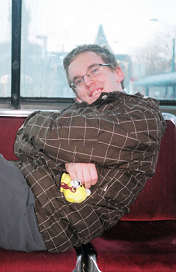
That his mother keeps him on this diet might have been part of the reason the social worker decided Gomey need to leave his home and family.
The family lives in Sainte-Adele in Quebec, a small town. Before the family lived in Toronto, where they had easy access to services which are not available in the small town.
The family is afraid that now the hospital has assessed that Gomey isn't automutilating and is no harm to himself or others, the attention will shift to his mother and the diet.
Because Gomey's metabolic disorder is rare the diet is rare too.
Even though the social worker is no doctor and no dietician, she has come to the conclusion that this diet (low oxalate diet, see http://www.ohf.org is not of benefit for Gomey.
Maybe she didn't understand that his loss of weight wasn't due to the diet and he was seen by the best of doctors.
Maybe she doesn't know that quite a lot of autistic young people have problems with either eatinghabits or weightissues, and that little is know about this correlation.
Maybe because Gomey's mom didn't agree with Gomey participating in a work program at a time he needed his energy for other things, she has decided his mother is not cooperative enough.
Maybe she has decided that Gomey's mother harms her son with a diet that can't be of harm when the proper supplements are provided, Like Gomey's mom does.
Who knows?
Gomey's family doesn't know why this social worker acted the way she did.
Before Gomey was taken from his home by a policeforce and several social workers he was happy and told his family he felt happier than ever before.
The family needs a lot of answers and Gomey needs to be free to go where he wants.
He's 19 and didn't commit any crime, so there's no reason at all for a 6 headed policecorps to take him from his home without his consent.
We need the story of Gomey spread to those who can take action.
We need lawyers to look in his case, because his rights were violated.
We need psychologists and psychiatrists who dare to speak out on behalf of this family.
Social workers who want to give a second opinion about the family,
and professionals who want to work directly with the family to support them and solve the matter.
Anyone who can contribute from his or her profession is welcome.
There are so many questions that need to be answered,
files to be requested.
Why was Gomey taken from his home?
Why did they come with so many people?
He is 19, so the law allows him to make a well informed choice. Why where his rights violated?
Etc etc.
We need you!
The family wants to cooperate in any way to solve this matter.
What you can do:
- Copy this graphic or the code and put it on your blog to draw attention to this story.
(If you're able to, download the graphic and upload it to your site. Either link properly, or put the url of the grapghic in the code.)
More graphics will follow.
Inform me about the url. - Write about Gomey and autism.
Let me know your url, so I can mention it here. - Inform your local papers and write/mail to those in de Montreal area.
Ask me for a press release, in case you need one. - Inform any of the media.
- Twitter about this story
and follow ActionAutism or Laanetweets to keep updated. - Send a card to Gomey and his family to show your care and support. Others will notice these cards too and know that this family is watched. Maybe they'll take better care.
- Rock the world so Gomey will be set free.
Gomey's family are an example of many families who have to deal with professionals who make daily life a hell, because "they know better".
Many parents fear interference of Childcare and other organisations because they take care of their children in a way which is not like society takes care of normal children.
Link to updates can be found at the top and here.
Autism is a neurological disorder which can't be cured, but can improve when the environment is able to adjust to the needs of the person.
Because of a lack of differential diagnoses many children are considered autistic and won't receive proper support and therapy, whereas they show autistiform behaviour which can be influenced with proper treatment of the underlying physical condition.
Labels: autism, awareness, call for ..., misconceptions, parenting, politics, psychiatry
It was absolutely clear for scientists that vaccines don't cause autism.
Simply because the rise of autism in countries where no vaccines are given to children mimicks the rise of autism in countries where vaccines are given, when careful, standardised diagnoses are made.
The whole way Wakefield and his team conducted the research was not up to the quality (and quantity) standards of proper research.
And... which is as important... the results couldn't be replicated.
It was interesting to see over the years that in countries where medical opinions are by law the privilege of people who are qualified to make medical judgements, people didn't belief in a relationship between vaccines and autism.
And in countries where everyone can spread his or her opinion about everything without having to take responsibility rumours were soon labeled "the truth", and people who knew how to play the media were called "experts".
I bet many of those "experts" earned a nice amount of money with appearing on TV and selling stories and alternative therapies.
By the way they targetted me when I spoke out against a link between vaccines and autism from the first moment on after I saw Wakefield's research, I knew that a lot more than believing the wrong prophet was at stake.
The way that for instance Jenny McCarty waved even the undisputable statements of The Lancet away was a clear illustration of how people can stick to their wrong assumptions.
And it's a pity that people just follow her blindly, instead of questioning themselves why on earth they hand themselves and their opinions over to someone who is in confict with doctors and scientists all the time.
Persistence is an honorable characteristic, but knowing when to change your mind and opinion in the light of overpowering evidence is at least as honorable.
But maybe I'm just lucky to have seen the signs and signals of autism in my 4 boys way before their vaccinations.
And maybe I'm lucky to accept that we don't know everything, and that nature is a strong force and we know just only part of what it does and how it works.
Science began with simple questions: why does something happen, how does it happen?
And from these simple questions people struggled to create a system to draw conclusions and to describe how reliable they are.
They used a lot of common sense in that they wanted to be able to get the same results when the same methods to find them were used.
Every day experience taught that when something occured once it wasn't a guarantee it would happen again, and that when events occured in a certain order that didn't mean the first event caused the second.
So they tried to control events to see what happened.
Research isn't a backyard game for those who like to see what they want.
Research is subject to lots of rules and requirements which have emerged in a long process.
This guarantees carefullness and limits the amount of mistakes, but it also limits the rate of development.
And all the time scientists have to describe what they do, because others should be able to get the same results under the same conditions.
Science doesn't create make-belief, but it does describe and recreate reality in such a way that others will be able to get the same results and won't see what's not there.
I know there are parents who keep saying that vaccines caused autism in their child.
They subject their (other) children to preventable health risk by not vaccinating.
Their children will call them to responsibility later in life.
But why would they stick to drawing conclusions from two events that took place in the life of their children?
Is it to flee from the rotten feeling that maybe genetics plays a role and that we, moms, conceived without knowing we would cause autism in our children?
Is it to forget what we ate, because maybe a cause will be in our food?
Or is it to push away the chilling fear that we might have seen the signs and signals of autism in our children earlier, so our child would have has better support?
It's for all of us as individual persons to answer to the questions life poses.
One of the main questions is: do we have enough knowledge to draw certain conclusions and do we want to take responsibility for what we tell others?
And do we have the guts to change our minds when we need to?
At least and at last the Lancet took action.
It should have happened a lot earlier.
We need your help to bring a very pressing problem straight into the limelight in such a way that no-one can deny the problem.
Lots of autistic children are prescribed medication which helps them in a way, but which also causes uncontrollable weight gain up to a pound per week.
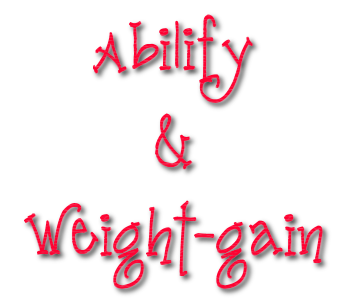
I need to hear from parents whose autistic child is using abilify.
Help me find them.
Please display this banner on your site to reach out.
Parents can contact me by using the contact button at the top of this site.
Please use: "Abilify and weight" in the subjectline so I'll catch your mail at once.
Our conversation in the national autism centre is, as planned, interrupted by a young woman who takes our son on a tour at the location.
The calm conversation changes when the oldest lady moves, with an unexpected short bust of energy, her body towards us.
With a sense of amazement I see her face changing and hear her voice getting sharper.
It's the father she targets after a fast look at me.
"We know autisme is genetic. Do you have any idea where it comes from?"
It's more a frontal attack than asking questions to complete a family profile or stating a fact.
The lack of accent on "we" creates the idea that the question is often used the same way.
"You" in my language has a polite form and it's used without the normal emphasis, downgrading it to neutral, bland, word and at the same time taking away any personal meaning.
But we're in the national autism centre, zo I assume they know how to relate to other people.
Without taking a breath before speaking, with visible amazement, the father mentions his brother and, after a short look at her face, himself.
The acknowledgement is almost tactible.
Clearly uneasy he ads: "That's why my wife has to take care of almost everything in our family."
A fast look at me should be the signal to the woman to stop interrogating him.
The bright rays of sun are unable to break the crisp uncomfortable feel in the room.
Just at the moment I think that it's time to take over the lead of the conversation the woman resumes: "It won't be easy with autistic sons".
Almost grateful for moving away from his achnowledgement he hastely ads: "No. It takes time to accept that, because every father wants his son to be normal."
It sounds like a closing sentence and is accepted as such.
The lady once more invests energy in a posture change, this time towards me.
Without changing anything in her facial expression she utters a sentence that should have sounded very understanding. "It's a difficult family. A heavy task for you."
It sounds like a far too many times repeated part of a bad theatre play and the complete lack of empathy, intended or not intended, stays with us when we go home.
There's more empathy in a written comment to a blogpost than at that moment in that small room in what should be the centre of autism knowledge and treatment.
Professionalism as a theatre piece, it seems.
The autumnleaves are waiting on the pavement for our feet to make them swirl through the sky.
The sharp wind is not stinging anymore, but feels fresh and authentic.
Ofcourse parents inform the school about the autism of their child.
It's the only way to realise the best support possible for their own child.
But it's a pity that in some school relevant information disappears in the files, which are often burried in a dark corner behind a closed door.
During meetings teachers are told about the child and the treatment plan/IEP, but my experience is that most teachers are willing to stick to the all the individual steps of the plans, but they tend to forget most of them during their busy days.
Some teachers even forget the child needs special care in- and outside the classroom, is my experience.
Ofcourse you can call for a new meeting with all people involved, but it costs a lot of time and some people don't like that at all.
So I began writing a leaflet for the teachers, mentioning the fact that autism is a neuro-biological disease.
After that I mentioned the special characteristics of my son, not forgetting that he has trouble reading faces, often forgets that he's put his homework in his bag and overlooks it, and that he needs a silent classroom to be able to take in relevant information.
The leaflet closes with advice to prevent problems,
like writing homework on the blackboard,
enabling him to leave the classroom first so he can walk alone to the next classroom without the crowds pushing him aside, etc etc.
At the back there was always a list of phonenumbers of people who were good in dealing with him, like his favorite teacher, the pedagogue and his brother in another group, and I'd put my email at a visible place so I could be reached for questions at all times.
Every year at the beginning of the schoolyear and after christmas all the teachers got a leaflet, and my son had one glued in his agenda.
No teacher was able to look me in the eyes and tell me he didn't know after that.
Worked well!
Dealing with autistic children changes parents and teachers.
They have to change, because it's important to take the abilities and disabilities of the autistic child into consideration.
One of the things I've learned as a parent is to examine my motives before I want my autistic children to do what I want.
What do I want to achieve?
Is it useful?
Useful for what or whom?
How do I want to achieve it?
Are there easier ways to achieve it?
Does my autistic child understand what I want?
Does he see the use of it?
etc etc.
I've learned patience, self reflection, understanding, and examining my own motives as well as those of others. And it taught me a lot about my child and autism.
Each child can be seen as a burden or as a rich source of change and inspiration.
I was shocked when I heard how some teachers were dealing with my children.
My children have been ignored, shouted at, humiliated, slapped and bullied by teachers.
I've never stopped telling them that teaching is not about pouring knowledge in and over a child, or using the child for owns own ego.
Like Maria Montessori said: the child should be the beginning, the child needs to develop itself and we are here to create the right circumstances and environment.
You don't belief that teachers are sometimes loosing it?
Here's an example:
The boy is a non-speaking autistic boy at Pittsburgh Public School.
The woman is his teacher.
The recording is made by the teacher's aid.
You can give your reaction, or your help here.
Some organisations, we parents of autistic children need, come to a standstill during the vacation.
Ofcourse no one can take over important work, as all those people are so very important.
So our letters, applications and other written materials pile up and up, until there's a layback of weeks or even months.
When I saw the deadline nearing of the response to the application for daycare for my autistic son I got the strange feeling that nothing would happen at all.
More than 2 months had passed after I threw the letter in the mail, and more than 4 after the decision was reached we would apply for daycare.
We all thought that he would go there at the beginning of the vacation, for two days a week.
Giving us 2 days of free breathing and maybe even time to take the other children on a few daytrips.
But all we got was a confirmation that the letter had been received and that the deadline was 40 workingdays later.
Now 36 days had past and I had such an intense urge to send them a reminder, that I looked up the email and wrote a nice mail.
The same day I got an answer.
They needed a special identification number and a letter from the council, stating they agree with him not going to school anymore.
The letter finished with the promis that we would get the permission for daycare as soon as the councilletter would be on their desk.
So we've been waiting for two whole months for something that could have been organised within an hour before the summervacation started.
Now we have to wait until the people at the council start working again.
Oh.... this makes me so mad!!
I wonder how long we would have been waiting when I hadn't send the reminder!
I've been asked to write about autism and work.
Maybe this should be a series of posts to go through the whole process of preparing for employment, finding a job, getting it and keeping it.
ASD in this post means: autism spectrum disorder.
Young people who want to prepare themselves for the future, or who want to earn money looking no further than the first pay check and the things they'll buy, just apply for a vacationjob at a supermarket or another place where they have simple jobs available for young people.
They learn from trial and error, listen well to the instructions and ask others when it's not clear what's expected from them.
People with ASD often won't be accepted when they apply for a vacationjob, or they are not ready even to want one.
Because they lack peer contact they won't hear from others about vacancies.
So, with the same age, they lack job experience, which put them often behind their peers.
The present knowledge about ASD provides enough to develop a way to guide people with ASD to a job that fits their abilities, and is challenging enough without discouraging the person.
Here we use a special system to enable people with ASD to get and keep a job.
step 1. Know yourself
Most important is to write down and learn about the good and less good characteristics of the person, regardless of a job.
This will provide a lot of insight in skills that are present and those which need to be learned.
Many people with ASD have troubles planning, keeping a good day and night rhythm, being somewhere in time, estimating time needed for a task, formulating questions, etc etc.
step 1a: improve yourself
Based upon this list of good characteristics and skills and weaknesses, a learning program can be made. Taking about 3 items at a time, during about 3 months.
Most of these tasks can be practiced as part of a normal day program with school, or daily activities.
step 2: Finding out what you want to do.
When it's known what kind of job the young person is interested in, information can be gathered. Realistic ideas about the job requirements can be created,
These requirements can be listed beside the good/weaknesses analysis, showing areas where further education is needed.
Step 2a: train yourself
Many people with ASD need to consciously learn appropriate behaviour as individual elements, need to synthesize them into a chain of behaviours, and they need special training to generalize learned behaviour to other settings.
For some jobs special practice settings are created at a school or as a daycare facility.
Take for instance administration, duties at a reception, and keeping track of stock in a shop.
This can be practiced in a kind of office at school.
Working at a restaurant can be practiced in a real restaurant setting where visitors know they're visiting a restaurant where young people are taught at the job.
Often this requires one tutor to one or two young people.
The tasks, set out in step two are taken into the program at the practice setting.
A boy who always arrives late will be trained to be in time both at home and at work.
To be continued.
July 9 I'll land well before breakfast in London.
Of course I can do with a welcoming committee. LOL!
The return journey isn't booked yet and depends partly on when I'm able to see some of my English friends, how much I have to spend, if we 2 (son of 23 and I) can find an affordable place to stay after the weekend and on how many speaking opportunities are offered.
You can contact me to speak about autism through the contact button at the top of the blog.
Because I've also had quite a lot of success with round table meetings and meetings where I answer questions people have about autism, I also want to offer my presence there.
Round table meetings can either be used to exchange experiences between parents, for instance, or to discuss matters about one person or case with all the people involved in the care for the person: doctors, school, parents.
Because I have 4 autistic children between the age of 16 and 23, and 2 non-autistic children, and their father is autistic too, I have a wide array of experiences to share.
I'm a psychologist, discovered autism in all my children long before their first birthday and even before their vaccinations.
I'm OK with all subjects. And I'm quite willing to travel outside London. (That's why we didn't book a place to stay after the weekend.)
So contact me and we'll work things out.
Michael Buckholtz has been on hunger strike for 30 days to raise funds for his non-profit organisation and to raise awareness.
I've blogged about him before on this site.
At this place I want to thank all bloggers who took displayed the graphics on their site or EC-bought the awareness graphic on their widget.
I also want to thank my fellow twitterers and tweeties, who tried to spread the message.
Getting the media interested in a genuine human being is far more difficult nowadays than it was about ten years ago.
But his message is strung, his humor is powerful, so I won't be amazed that he'll find his way into the hearts of many people.
The local paper of Macon publicized an article about Michael and made a video which you'll find at the right top of their page.
Thank you Michael for all you do for people with autism and for autism families who are struggling with the financial burden of autism.
Let's keep on spreading the word!!!
Michael Buckholtz is on day 29 of his hunger strike for autism.
Read all about it here and in this post.
Not for himself, but for families and individuals who need money to get a proper diagnosis and who have no access to treatment otherwise.
Girls and women, and people from the lower social-economic classes are underdiagnosed.
Girls with autism are often withdrawn or overcompensate their autism, children and adults with autism from the lower social-economic classes are often told they suffer from bad upbringing.
Because there's no proper diagnosis they don't receive treatment.
A lot needs to be done and your help is needed.
The public needs to be informed, not only about the characteristics of autism, but also about ways to find a proper diagnosis and treatment.
Your help is needed.
- To spread the word about this strike (see here for info and banners,) on your blog, on twitter and other social media
- To inform papers, radiostations, shows and TV-stations about the strike
- To motivate others to help
- To donate, even when it's one or a few dollars: here
- To buy his book. See here.
I know, it's awful to say, but most people don't care, because their children are healthy and do well at schools and everywhere else.
But many children are unhappy, because they're told every day they should behave better, but they can't.
Autism is a neuro-biological disorder that presents itself in all sorts of ways. In social behaviour, in communication, in understanding the world.
When we diagnose children early we can help them to understand the world better and find a place in it so they can be happy.
Help Michael reach the media so a larger audience will hear his appeal.
Please.
News:
He'll accompany John Elder Robison on some of his lectures in New York
RadioBlogRadio will feature Michael on june 17 on a special radio broadcast
Finally more people on twitter react.
New research shows people with autism have more language problems than only taking things litteral.
Cathelijne Tesink, from the depertment of Psychiatry of the Nijmegen University UMC St Radboud and the Donders Institute for Brain, Cognition and Behaviour.
She knew that people with autism experience problems with complex language, and often can't understand jokes, for instance.
She wanted to know whether the language problems are only limited to complex language or whether basal, implicit language poses problems too.
Because spoken language is embedded in the information the speaker and his voice tranfers, distorted perception of the speaker might interfere with understanding of what's said.
She offered people with and without autism sentences which belonged or didn't belong to the voice who was saying them.
Like a child saying that he always drinks a good glass of wine before going to bed, and a grown up saying the same.
Both groups (those with autism and those without) were aware that something strange happened.
In both groups the brainscans registered activity in the language center of the left hemisphere.
But... in autistic people the same area in the right hemisphere was activated too.
Like their brains needed to compensate something to arrive at the correct interpretation.
This finding is in line with the earlier findings that people with autism take language literally and that they have difficulty interpreting the context of language.
(And it also is in line with my observation that many autistic people need more time to process language and children need more explanation to understand language.)
The brainscans showed another difference.
When processing the correct sentences people without autism activated a brain area that is involved with self reference.
This area is active in the evaluation of oneself and others.
This area was not activated in people with autism.
This is the first time scientific research shows that people with autism use compensating neurological mechanisms even for normal daily language.
Even the most basic levels of language understanding are involved.
This is a huge step forward to a new way of diagnosing autism.
Research was published in: Brain
Ever done this game:
People are all standing or sitting in a line.
Someone writes down a message and goes to the first person and whispers a message in his ear.
This message is whispered in the ear of the next person, etc etc.
At the end the message is collected and written down.
There's a large chance the message is transformed during the process.
That's what happens with scientific research.
A researcher finds data which are translated into a conclusion about the researched subject.
This conclusion is summarised, and there it goes: the media, all sorts of people, on and on it goes...
You'll understand what the result is. :)
One way scientists battle this problem is very simple:
Mention the source of the information and the place where to read the precise details of the research.
That way relevant information can be found within minutes.
My advice is to do that too when you write a blogpost, an article or anythings else.
Such a little effort for such a great result.
Take the message: "Autism can be cured" or "children can recover from autism."
This message refers to a research presentation at a conference by professor Deborah Fein of the University of Connecticut psychology.
I haven't found the exact text of her presentation, so I have to go by reports from those who attended the conference. (So that's seceond hand knowledge).
The results are from 20 children. (Far from being enough to draw acceptable conclusions.)
The study involved children from 9 to 18.
It's not clear whether the ages also involve the first diagnosis. But I have to assume not, because it was said children were diagnosed before age 5.
I have no access to the diagnostic criteria, which troubles drawing a conclusion.
And I have no idea which neuropsychological tests were used.
Some of those tests will be done better a second and third time, regardless of improvement of the autism.
Interesting is the description of the group of children that showed improvement:
Many have been diagnosed with relatively mild cases of autism, many also have above-average IQs. At age 2, many were within the normal range for motor development, able to walk, climb and hold a pencil.
Interesting is that it was told that in most cases improvement was already seen at age 7.
(Which suggests late onset development, instead of real autism. But again, I haven't seen her diagnostic criteria.)
75% of the children had other disorders, which raises the question whether these children had autism at the time of diagnosis, or displayed autistiform behaviour as a symptom of an underlying problem.
The children all received intensive therapy during the main part of the week.
In fact Fein published nothing new.
Former research conclusions reported 3 to 25% of improvement of autistic behaviour towards acceptable behaviour.
The results of Fein, 10 to 20%, is well within that range.
In fact the media could also have reported:
Less children are cured from autism.
Fein acknowledges that most children will remain autistic, despite lots of therapy and other ways of intervention. With other words 80 to 90% of the autistic children will have to battle autism all their lives.
That pretty opposes all those tweets, blogposts and articles telling me there's a cure for autism.
Ofcourse I want hope, but no false hope.
Do you know where I've found hope?
Here.
Maybe wanting to normalise autistic people is not curing them at all.
A good diagnosis is always very important.
We all agree that a good physical diagnosis is of utmost importance.
When someone is told he has a lungdisease he will receive treatment for that specific lungdisease.
When he has in fact a heartproblem, this will deteriorate and the person will die.
we all understand that.
People with autism probably won't die of a wrong diagnosis (but be aware: some treatments published as healing therapies for autism create a risk.).
A wrong diagnosis however leads to wrong treatments, wrong therapies, and even wrong understanding of the subject of autism.
It also causes lots of distress for the autistic person, the family and all people who are dealing with this person.
A diagnosis is a part of an ongoing process of observations, realizations, descriptions, expectations, therapies and treatments, leading to development of the person and adjustment of the social environment to the needs of the person.
A wrong and incomplete diagnosis has huge implications.
Children might not get the support they need or be subjected to treatments and therapies which are unnecessary.
Even though the autistic person might seem to improve, because behaviour fits better in society, a balanced development may be at risk.
Especially in this time, when groups of people are all over the media and internet telling others how their children have improved or even have been cured, the wellbeing of autistic children is seriously at risk.
Not because people can't afford the expensive treatments, but because those treatments contain the risk of interfering with healthy physical development.
We need to be aware of the fact that these consequences often need a long time to build up and come to visible expression.
I don't argue some children show remarkable improvement.
But that doesn't mean all children with the same autism diagnosis will react the same.
When diagnosing autism only involved a limited array of examinations, deficiencies and other problems might have been missed.
Another reason good diagnosis is important is that we need to get reliable information about the number of cases, and we need to develop the knowledge about autism as fast as possible.
Some researchresults can't be compaired because different and/or imcomplete diagnostic protocols (sequence of steps) are used.
When measuring cummunication for example it's important to know that all researchers use the same definitions and are talking about exactly the same.
Otherwise we're compairing classic autism and high functioning Aspergers for instance, apples and pears, and we don't even know it.
A well conducted diagnostic procedure can be repeated and lead to the same conclusions.
Only that way we can measure progress within the person.
Only than we can rely on the claims that certain treatments are of benefit to autistic people.
The past years I've had many questions from parents who don't know where to go for a proper diagnosis.
Teachers, social workers, pediatricians, neurologists and others are not able to make a reliable diagnosis. Nor are chiropractors, nannies, grandmas, and family doctors.
Because a good diagnosis is so very important it needs to be conducted by a well trained and specialised professional who is also able to give sound advice about treatment options, and who is able to organize proper referral.
In case of autism this needs to be a certified psychiatrist who is specialised in child and adolescent psychiatry, with the assistance of a team consisting of specialised (and certified) psychologists, and others.
So a good diagnosis requires:
- to rule out all medical problems as good as possible.
Like vitamin deficiencies, gluten intolerance, epilepsy, metabolic diseases, brain damage etc etc. (if necessary start treatment and record results.) - a good description of existing medical problems
- constructing a careful and well controlled family history
- ruling out all other psychiatric problems (by certain tests and other means)
- careful questioning parents, family members, teachers etc. about their observations.
- careful questioning parents, teachers and professionals about what they have done, treatments, etc and the results.
- observation with one way screen so the child can be observed without strange people in the room. If possible observation of communication with parents, and later alone with stranger. If possible during play, during structured and unstructured tasks.
- This all should be done by certified psychiatrists and psychologists specialised in children and adolescents.
- The diagnosis should be made based on the DSM (diagnostic and statistical manual of mental disorders) which is most recent. The number of the DSM should be mentioned, as well as the number of the diagnosis.
- The diagnosis should be verified every 2 years. Because of the advance of science, but also because change and additional symptoms will be documented.
But this is the best way to do your child justice.
With a good diagnosis it's easier to make a choice for the best treatment, and no time is lost trying other things.
The earlier and the better your child is diagnosed and the earlier proper treatment starts, the easier your child moves through life.
Today the autism twitter community was buzzing about the rise of autism cases in California.
It made clear no one bothered to read the article of Mercury News.com written by Sandy Kleffman.
OK, the title created the misunderstanding.
"Autism in California increases twelvefold" it said.
But why people retweet articles without reading them is a big question to me.
Why send your friends a text you haven't read yourself?
The first sentence states:
"California saw a twelvefold increase during the past two decades in the number of autistic people who are receiving services through regional centers, a new state study reveals."
This simply means that more people with autism have turned to the regional centers for support.
This doesn't mean that the number of autistic people has increased.
What bothers me in the article is the definition of autism.
"Autism is a severe developmental disorder marked by communication difficulties, an adherence to routines and a lack of interest in socializing with others."
Many autistic people, and we're talking classic autism here, don't have a lack of interest in socializing.
Because of their communication difficulties, they problems understanding social processes and the lack of acceptance they encounter, autistic people feel not well equipped to socialize.
Many do feel an inner longing to belong to their peergroup, to other groups, to have friends, but they sense a distance they can't bridge themselves without support.
It's one of the reasons autistic people seek help at support centres.
The deputy director of the community services and support division of the state Department of Developmental Services, Julia Muller, is cited in the article.
She states that her agency has developed guidelines on diagnosing autism and effective interventions.
What we need to be able to get comparable diagnoses is one clear system.
Not each division making up it's own rules.
The DSM IV, and preferably it's revision the DSM-IV-TR needs to be used to reach proper diagnoses.
These guidelines are developed by experts and are only open for discussion as long as the development of DSM 5 is concerned.
more info here.
Sometimes someone can be caught by such a strong inner urge that nothing, nothing can stop him.
When I met Michael Buckholtz at Twitter, I felt this is one someone special.
Oh yes, he is.
He was diagnosed with high-functioning Asperger's Syndrome and OCD and he battled all the battles children, adolescents and grown ups with that diagnosis are faced with.
Like in my family all males in his family had their own unique form of austism.
His perseverance and his positive attitude made him into a caring person, who fully understands the problems autistic people and their families are dealing with.
One of the main problems is finding enough care, support and therapy.
It simply costs too much money to do what's needed.
Michael founded the AACF, INc. The Aid for Autistic Children Foundation, Inc.
It's a non-profit organisation which aims to reduce the financial burden on families.
But he does more.
Today he started a hunger strike to bring the needs of autistic people to the attention of the media, the governments and to all who need to listen more.
Each day he will blog about his condition here at his blog.
There are several ways you can support him.
I don't think you can talk him out of the hunger strike, but you can report his efforts to your local media, because austism concerns us all.
You can blog about him, and about autism.
When you don't know what to blog about, just get in contact with Michael, with an autism family in your neighbourhood or online, or with me.
Buy Michaels book.
He knows what he's writing about.
You can find everything about it here.
Michael is at twitter: @TheBuchNation and @Aid4ASDKids
I wish Michael will reach his goals.
Let's all help him!!
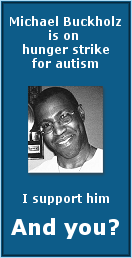
Download this image to your computer and upload it to your site.
Link it to:
http://autismsupportnetwork.leveragesoftware.com/blog_view.aspx?CustomerID=buckholtz
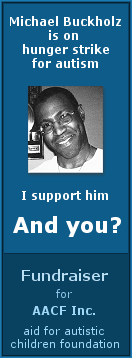
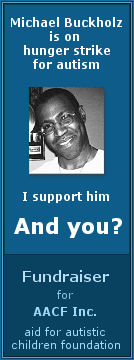
Top one without white border:
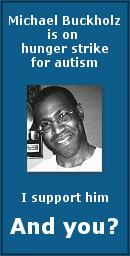
...and
I can put your name on this 125x125 button for you.
Please mail me with the subjectline: custom button for me, with your name and email.

This button can be used in your sidebar, linking to one of the sites of Michael or here, and on entrecard, for instance.
Now there's so much publicized about autism I meet many people who know it all.
Even the media embrace without criticism people who claim their son or daughter suffers from autism, and especially those who claim to have found a cure get a place in the centre, right in front of the camera of microphone.
They are presented as beacons of hope, whereas they're in fact they're lights from hell burning on earth.
Firm words, I know.
Why I used them?
Because I want to warn people.
Children who have autistic features (or autistic characteristics as some people prefer) are not necesarilly autistic or suffer from an autism spectrum syndrome.
Braindamage, due to hypoxia during birth, a car accident or a disease, can cause symptoms that mimick those of autism, without being autism.
The effects of autisticlike features caused by a carcrash can be reversed.
That's why miracles seem to happen.
So my advice, as a specialized psychologist, is to listen carefull to the stories people tell.
Seizures are not a feature of autism, for instance.
It's nice that people stand up for autistic children and their parents, but bringing the message of miracle cures, of success of the effort to heal their child, give some people the idea that parents are not doing all they can for their children.
I've had that feeling too.
It was like my sons have a button somewhere that needs to be pushed and I can't find that button to delete their symptoms.
And even more painful: I've been told by people I'm not dealing with the autism of my sons right, because they only improve so little over time. I'm not only a lousy mom, but also a failing psychologist.
Sorry, buttons are constructed on people when they live. Autism is inborn.
The other day I read about cerebral palsy.
It was a historical account, telling about the early days when the diagnosis cerebral palsy couldn't be verified as well as in this century.
People only needed to exhibit a tremor and panic was created.
Now cerebral palsy is a well described clinical diagnosis, with a clearly structured treatment.
I'm sure we're headed that way too, and in due time we're freed from the socalled miracles people bring in the news.
I'm looking forward to it.
He's angry.
Because he wants to learn to cook, and I welcome the idea of boys being able to make something for themselves, he helped me making dinner the past three days.
One day he got me a package of spinach from the freezer.
Nothing special for normal kids of 16, but when you're autistic it's quite something to open a door and put your hand between all sorts of slippery and icy things.
He hates it, but because getting all the ingredients belongs to cooking, he took the package out.
The next day he boiled water and put the spaghetti in it and kept a close watch on the clock.
It nearly smashed my nerves.
Being updated of the time every 3 to 5 seconds during 11 minutes by someone with a loud voice doesn't feel good.
But we both managed...
And yesterday he boiled the eggs.
I thought 4 minutes of time-updates were enough. LOL!
This morning he was still proud of his accomplishments and told us over and over again we would have starved without him.
Which is ofcourse quite an understatement
The girls told him they liked his help, his father told him he should also cook dinner today.
It was meant as a compliment,
but it turned out a complete chaos, because son felt that people in the house were using his talents for their own good (wow!), etc etc.
He doesn't have meltdowns very often anymore.
But today he did.
And because he quit his meds a few weeks ago, there was nothing that helped him to be in control of his emotions.
After saying all sorts of painful things to those who are at home, and yelling a lot, he's now complaining his computer doesn't work anymore.
I'm not ready to have a look.
And I'm certainly not ready to have his father have a go at him because he broke his computer.
Last time he pulled a plug out and I was the one to "diagnose the problem", because the help of 4 males didn't do any good but stir emotions even higher.
Oh, and by the way, I'm the one to cook tonight. No eggs, no spaghetti and spinach. But potatoes, red cabbage and sausages. Because I like it!
update:
Nothing wrong with his computer, the rolling shelf the keyboars stand on got stuck because a screw was a bit loose.





